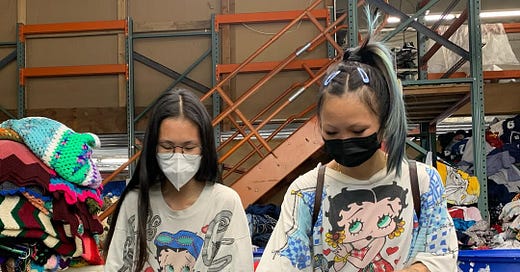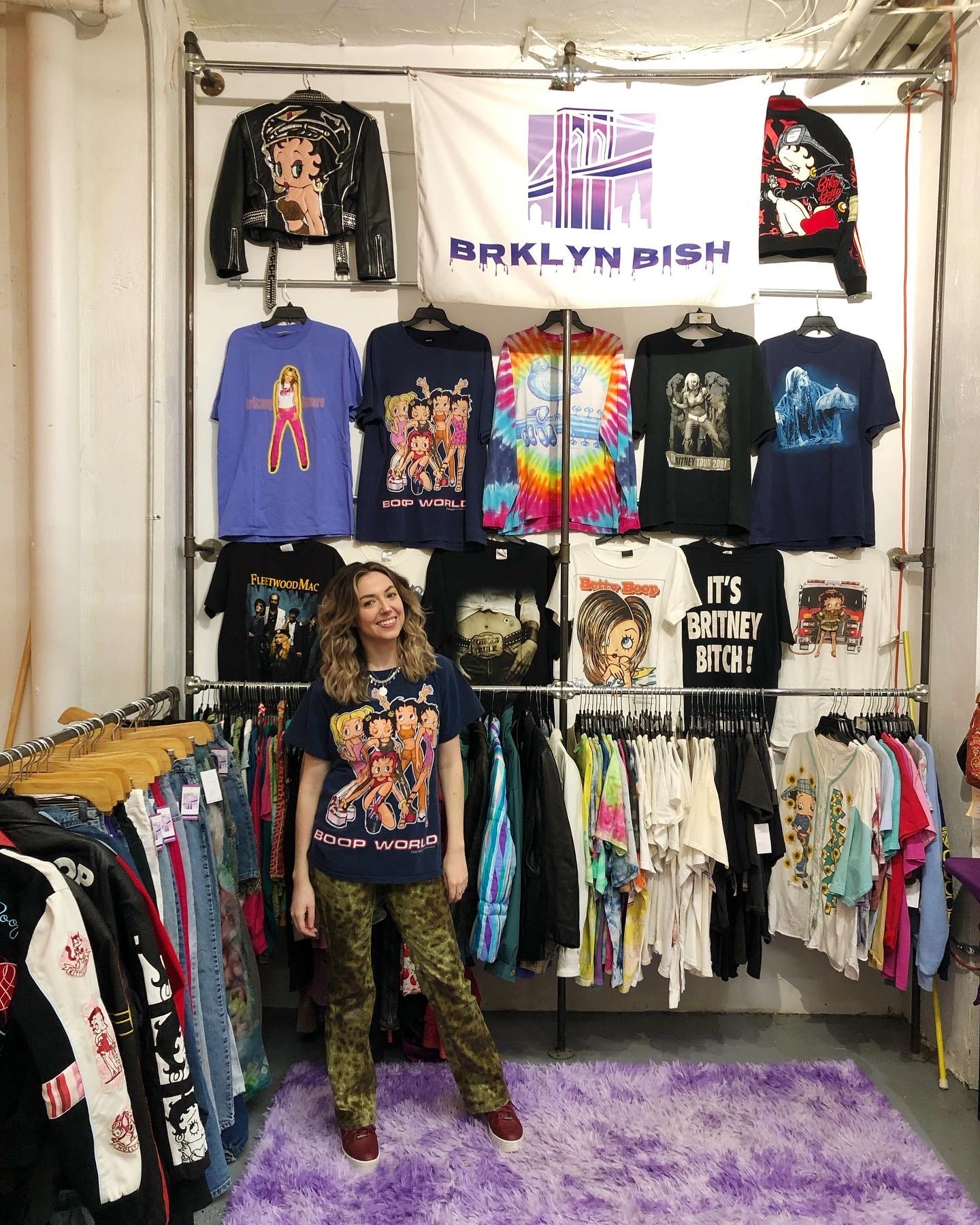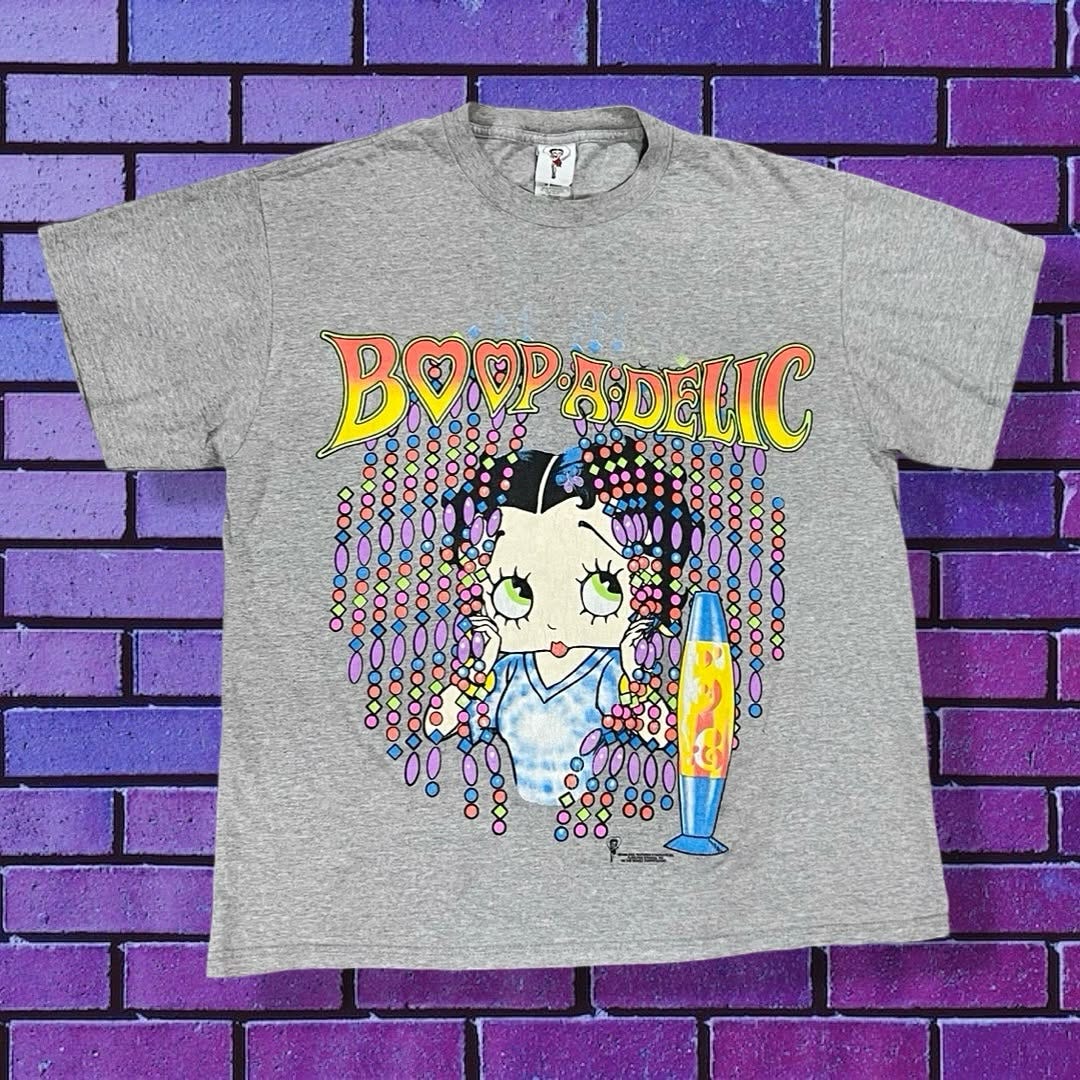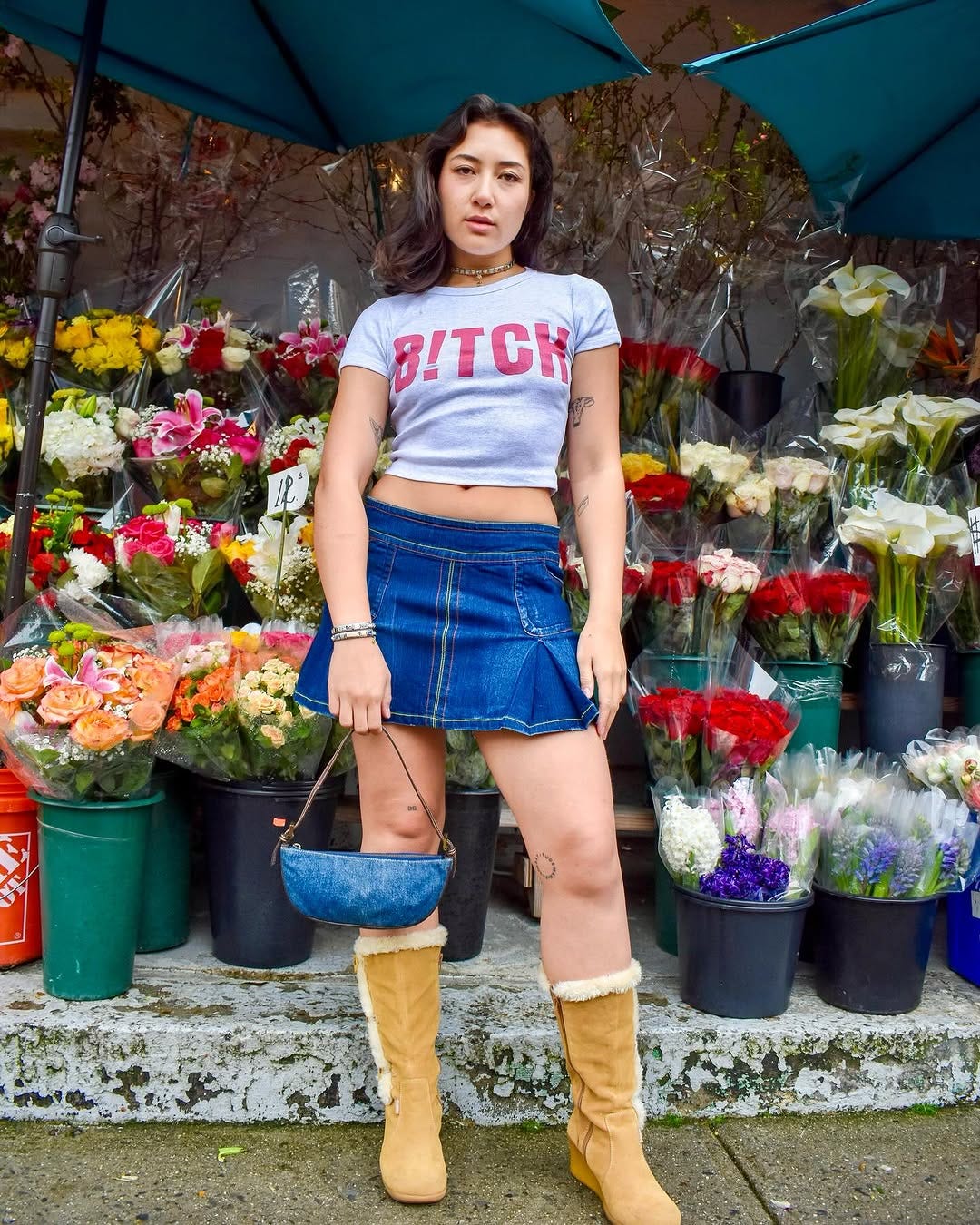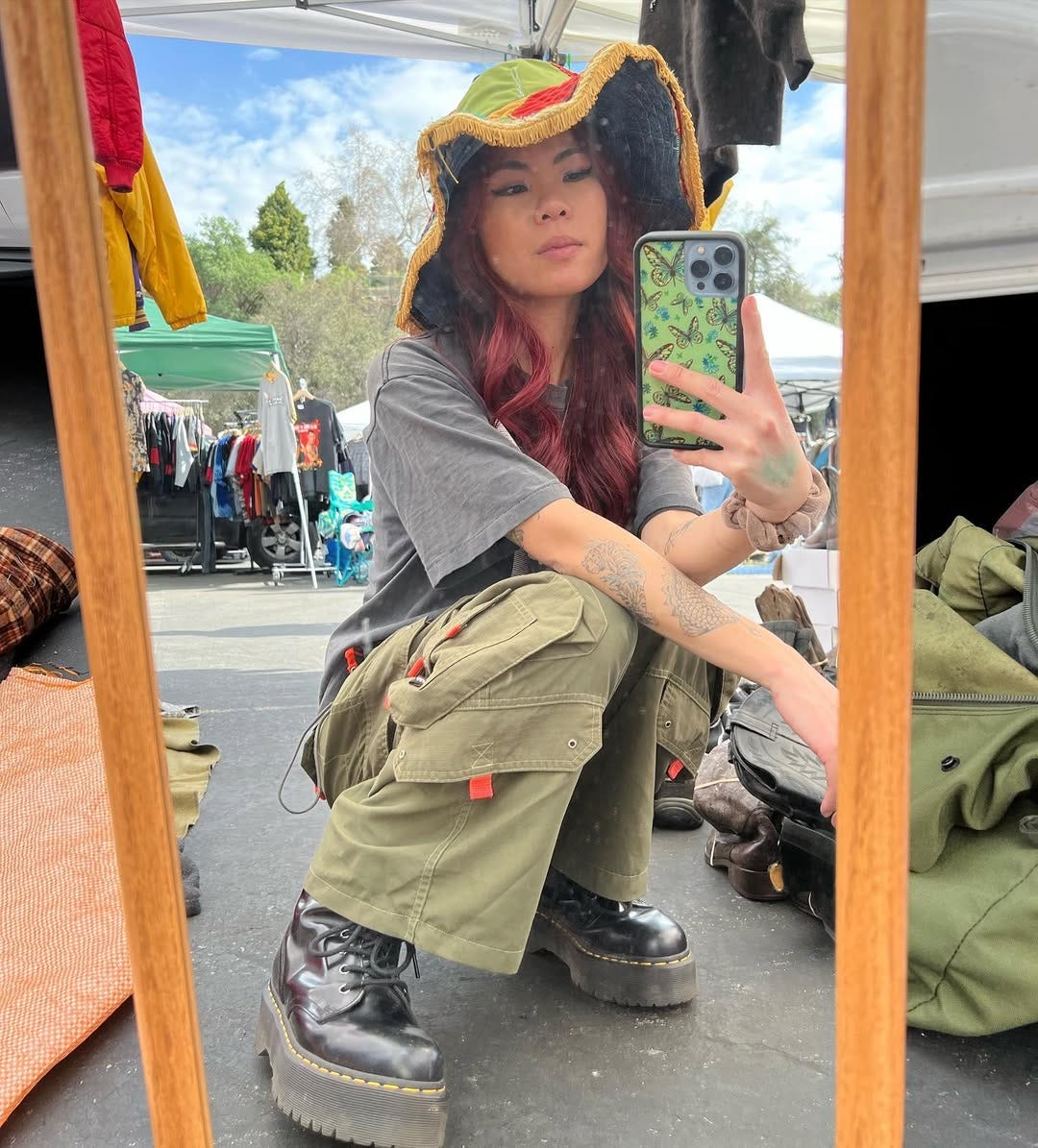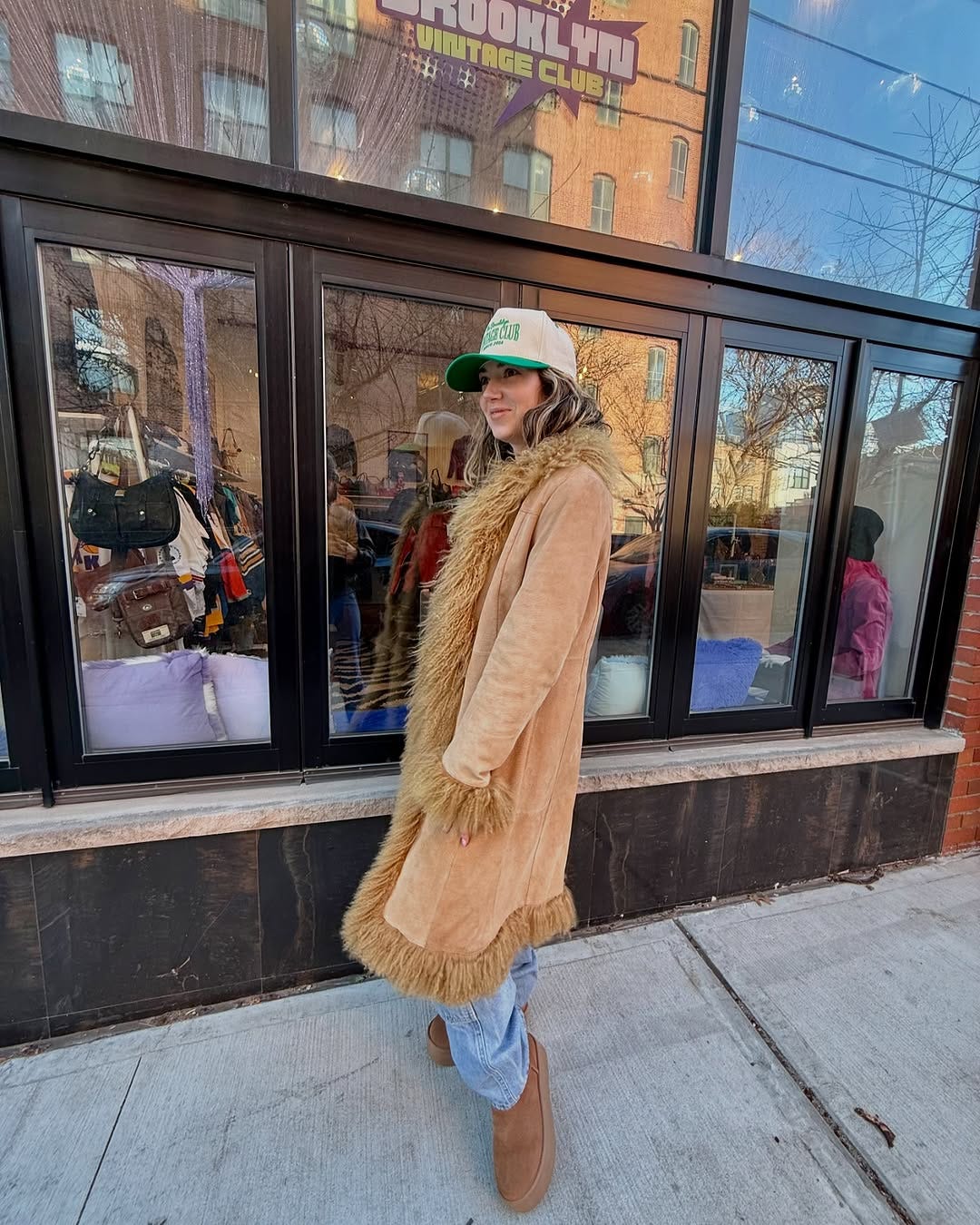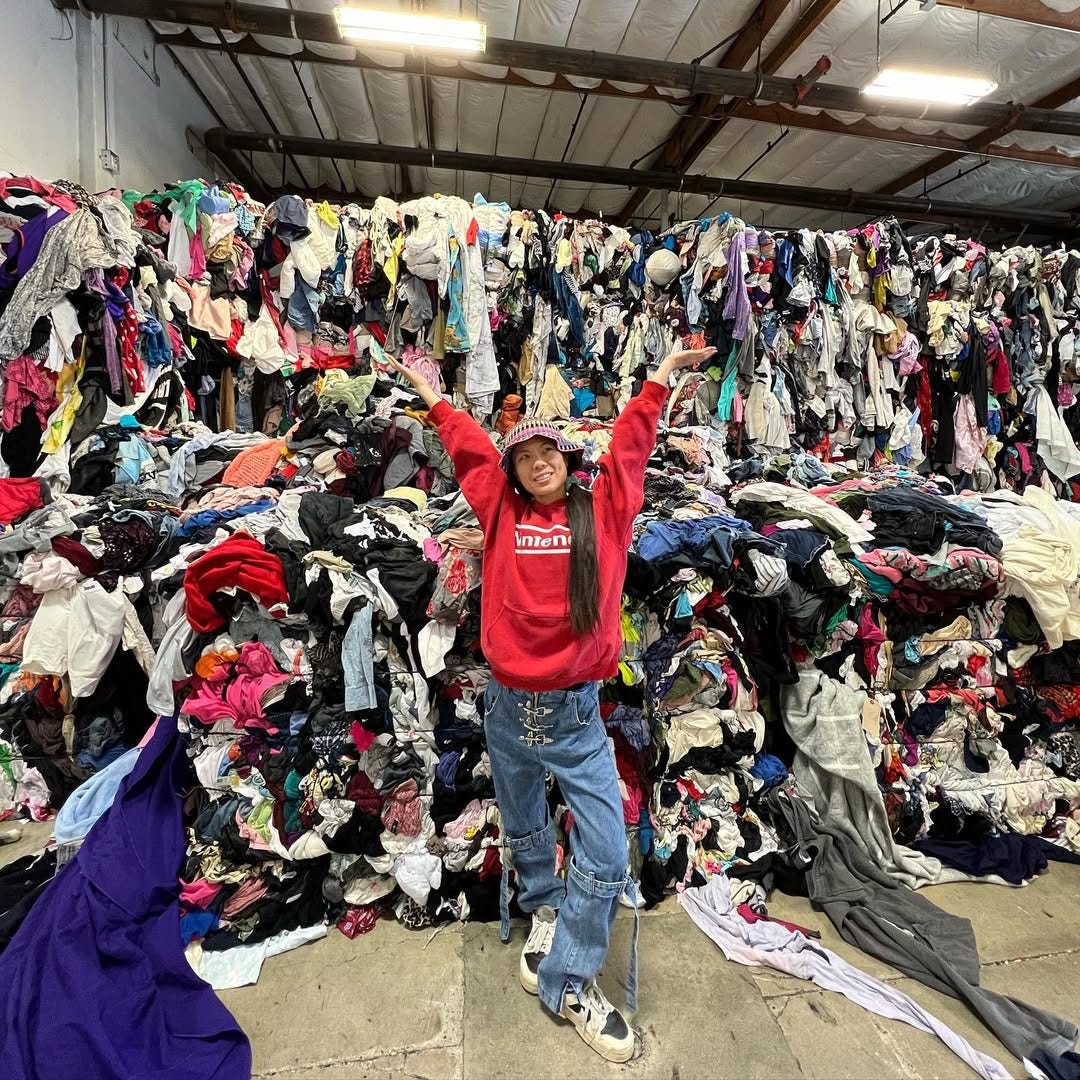Not Just a "Depop Girly..."
women in vintage t-shirts share their perspectives on 'T-Shirt Bro' culture, and why they're carving out their own community
I’m Emily Stochl🎤 and this is Pre-Loved, an independent, go-to voice on all things resale!
To support reporting on the culture & impact of vintage & secondhand fashion, and to read my deep dive commentary (the kind you won’t find anywhere else!), please become a paid subscriber today!
“Yes, this is my livelihood, but it’s not so serious that I need to elbow someone out of the way for a $1 t-shirt with a hole in it. Like, it’s just not that serious!” Sarah Bentley laughs, telling stories of her early sourcing escapades at the Goodwill Bins.
Bentley, 42-years-old from Richmond, Kentucky, first visited “the Bins” with her husband on a random Saturday after watching a TikTok video about the discounted thrift finds. Three years later, she left her full-time job to resell vintage clothing, calling her shop — which has a major focus on vintage t-shirts — True Heart Vintage.
The Goodwill Bins are Goodwill’s outlet stores, where deeply discounted clothing is sold by the pound — at Goodwill Kentucky, prices range from $1.99 to $2.29 per pound for adult clothing.
Most donated clothes remain on the retail floor of a Goodwill for about four weeks before being sent to sorting warehouses, where they may get one final chance for sale at the Bins. In those backroom, workers categorize items by type — wares, textiles, shoes and accessories, electronics, glassware, etc. — before rolling out covered blue blue troughs to the floor.
Shoppers push their squeaky-wheeled carts to the edge of the fresh blue bins, waiting for workers to pull back the covers and whistle to signal that digging can begin.
If you’ve ever been to the Bins, you’ve likely seen young men — typically between 16 and 25 — ravenously digging through tangled heaps of clothing, sometimes even getting into fights over ‘90s Hard Rock Cafe t-shirts, and the like. When the vibe gets particularly chaotic, workers use plastic fencing to prevent shoppers from prematurely jumping the troughs, where they dig in with their gloved hands.
Shoppers sort through these bins, tossing aside jeans ripped from crotch to knee, stained baby clothes, and lonely separated shoes in search of hidden treasures. Each bin remains on the floor for about four hours before being wheeled back, where the remaining items are categorized for “end of life” processing — which includes bulk sale to rag houses, baling for export, or recycling and shredding as appropriate.
Resellers, whose arbitrage helps divert clothing from textile waste streams, are on the rise, but The T-Shirt Bro, who flips vintage tees at flea markets and streetwear fairs across the country, is an animal unto itself — a microcosm of resale, which everyone in the scene recognizes, given their total dominance of the t-shirt space.
But where are their femme peers? T-shirts are arguably the most gender-neutral and size-inclusive vintage genre, but women vintage-tshirt dealers are few and far between. “100% there are more men selling vintage t-shirts than women,” Bentley tells me. “It’s kind of fascinating because the fashion industry is so geared toward women — like women consume and buy most of the clothing, but it’s predominantly men in this field, for sure.”
Julie Graff, owner of Williamsburg’s Brooklyn Vintage Club became interested in vintage t-shirts through her love of ‘90s and Y2K-era music and concert merch. She immersed herself learning about reselling tees through social media, and one research rabbit hole led her to vintage Betty Boop merchandise — still a staple of her business today.
In her early days of vintage, Graff participated in streetwear events in New York City that catered to vintage t-shirt dealers. However, she quickly noticed she was often the only female dealer. “I wasn’t surprised to be the only girl — I mean, I was surprised to be the only one, but I wasn't surprised that there wasn’t a lot.”
“The fashion industry is so geared toward women — like women consume and buy most of the clothing, but it’s predominantly men in this field, for sure.”
She also realized her target customers weren’t at these events either, as familiarity and alignment with the vendors is often the draw that brings shoppers to the show: “I didn't do too well at them, to be honest. And I was like, okay, this isn't my customer base.”
Graff’s most collectible tees feature the likes of Britney Spears or Betty Boop, whereas the standard vintage t-shirt “grails” depict sports teams, race cars, cartoon characters, and classic rock bands. Is it the vibe of the graphics themselves that attract more men to the space?
Tori Kobayashi, a 32-year-old from Long Beach, has been sourcing vintage graphic tees for most of her life. She grew up playing basketball and loved wearing baggy t-shirts on, and off, the court. After moving to Los Angeles, she started visiting the Rose Bowl Flea Market every month, where she began collecting graphic tees featuring ‘90s cartoon characters.
“I grew up watching the Saturday morning cartoons,” she said, “and they had a lot of sentimental value. I just collected and collected, I would go to Rose Bowl once a month to get Looney Tunes graphics.”
Encouraged by friends, Kobayashi started casually reselling tees on Depop, as Nostalgic Threadz, when both the app and ‘90s vintage tees gained in popularity. She soon realized reselling was a great way to rotate through different t-shirts or, as she put it, “to level-up, and get the desired graphics I really wanted.”
On the West Coast, the vintage t-shirt community is also predominantly male. Kobayashi said: “They [the dealers] built the audience, you know? So they kind of set the tone. When you're in a niche, but you're different than the mainstream of it all, you're going to have to fight against that current a little bit.”
Both Graff and Bentley enlist their male partners to help on market days, and they’ve found it’s not uncommon for people to mistake their partners as the t-shirt booth’s owners.
“Sometimes, when my boyfriend would help me set up, people came up to him thinking it was his booth,” Graff said. “And I was like — ‘oh my God, no! This is mine!’ He’s just helping me put together racks and carry stuff in. I mean, I appreciate him, but it’s just so crazy how dominant this attitude is, even in New York.”
“When you're in a niche, but you're different than the mainstream, you have to fight against that current a little bit.”
At markets in Richmond, Bentley’s husband and business partner typically stands right outside their booth, “just to make sure nobody’s walking off with a t-shirt, you know, or basically acting as a lookout.”
“Guys will come up to me thinking they can get a better deal from me because they think I don’t know what I have, or what I’m doing.” she said. “And it's like — I'm okay with you walking away. I'm not going to chase you down for the sale. I know what that’s worth, and if you don’t want to pay it, that’s fine. But, I'm not going to chase you down.”
She thinks it’s a bit of a self-fulfilling prophecy: a lot of women don’t enjoy duking it out with fellow shoppers at the Goodwill Bins, so they find other ways to source. Whereas, the T-Shirt Bros hit the Goodwill Bins every day after school, or first thing on the weekends — 8 a.m. sharp on Saturdays. They think the hustle and competition proves their skill or expertise— that’s why getting the flat-lay pic of your finds in the Bins is a badge of honor. “There’s not always a lot of women at my Bins,” Bentley noted. “So they don’t really see many women there who aren’t moms.”
The bro-ishness extends to online spaces, too. During one of Graff’s live sales —especially popular during the reselling boom of 2020 — a male viewer left a long string of comments that were a mix of “condescending and creepy,” until other viewers called him out for it.
“They dragged him in the comments — so much so that he sent me a voice note apology,” Graff said. “But, of course, it was about the worst apology I’ve ever heard.”
Are The T-Shirt Bros who are out hustling and grinding for grails just a symptom of the internet’s “manosphere” — all that elbowing at the Bins another expression of hyper-individualistic macho culture?
It does add up. In the 2024 election, every demographic under 25-years-old voted more Republican than millennials did at the same age — largely, they say, driven by economic frustration from the status quo. The realignment was especially stark in 18- to 24-year-olds: as young men shifted more than 20+ points toward Republicans, creating the largest gender-gap ever recorded in American politics.
And a recent survey of more than 24,000 people across 30 countries revealed 57% of Gen Z men felt women’s equality had “gone too far.” Yet, according to research from Equal Pay Day, women still earn 18% less per hour than men—a wage gap that has made negligible progress over the last three decades.* In fact, much of the decline in the gender wage gap since 1979 is due to stagnating wages for men rather than significant wage growth for women.
*No such wage data exists for the secondhand industry specifically, but hold-tight, I’m working on something…
“There’s not always a lot of women at my [Goodwill] Bins. So, they don’t really see many women there who aren’t moms.”
Once at Regeneration — one of Graff’s regular markets in Brooklyn — she actually converted a skeptical male customer. She was selling a rare vintage Spice Girls t-shirt from their final complete tour together in the late ‘90s. It was priced for $100, and when he questioned her on the price, instead of brushing him off, Graff saw an opportunity.
“You know what, let me just see if I can change his mind,” she thought. She explained to him: “It’s not just a really cool shirt — it’s a piece of history, low key. That’s how I think about vintage clothing!”
An hour later, he returned and bought it.
Kobayashi has since shifted away from selling vintage t-shirts, specifically, and now she collects them purely for herself. She went through, what she calls “a total liquidation phase,” archiving her favorite pieces while letting go of the ones she no longer wears.
“It’s funny, though,” she said. “Because now I'll go to Rose Bowl, or walk around at Silver Lake, wearing my grail t-shirts, and I've been getting recognition from the t-shirt guys lately. They’re like, ‘dang, like you have really nice stuff!’ I’ve definitely noticed a shift in how they perceive me, which is kind of interesting.”
She laughs, “Girl, it's so confusing sometimes to be a girl!”
It’s not just their male peers in the vintage t-shirt space that female resellers have to contend with — they also bear the brunt of online hate that gets lobbed at resellers by both men and other women.
Research consistently shows women are more likely than men to experience online trolling, harassment, cyberstalking, and even violence. In secondhand fashion, the heated discourse typically amounts to accusations of unreasonable pricing and greediness — criticisms largely directed at the, so-called “Depop Girly,” an internet shorthand for the, mostly young, women who resell clothing on the app.
“I think it's just plain old sexism, honestly,” Graff said, “I mean, criticize whoever you want to criticize, but it's so boring to me — a lazy argument. Have you met a t-shirt bro, ever? They'll run across the room to grab something out of your hands!”
The “Depop Girly” language is not benign, though. Young women — particularly when they’re successful or otherwise taking up space — are society’s favorite targets to chop down, in the name of “putting them in their place.” That the criticism of resellers gets coded in language around young women — girls, even — who turned resale into a business, just like countless others before them, is telling.
“It's sexist, whether it's intentional or unintentional,” Graff agreed.
Though some might say the critical comments are just ‘the price you pay,’ for doing business online, for others, getting 5 million “hot takes” on your thrifted finds — the vitriol so noticeable it gains a write-up in Buzzfeed — is a nightmare. Most of this energy comes from people who are “chronically online,” though, who wouldn’t say anything to you in person, Graff says, “usually it’s people who don’t understand how the business works, either. I’m like, do you know what Lululemon’s markup is, and how they make their product? You would hate to find out the truth about them, if you hate resellers so much!”
According to the Global Fashion Agenda, of the approximately 94 million workers employed in the global garment industry, women make up 60-80%, mostly in the lowest-paid positions. Meanwhile, C-suites remain dominated by men. In 2024, the highest-paid fashion CEOs were all men: John Donahoe (now ex-CEO of Nike) earned $29 million, Doug McMillon (CEO of Walmart) earned $27 million, and Calvin McDonald (CEO of Lululemon) earned $16 million, among others.
Despite the discourse, Graff doesn’t waste time arguing on the internet because she believes it’s rare to change someone’s mind online—unlike in person, where sometimes something just “clicks.” Ultimately, she decided online spaces weren’t where she would thrive with her vintage business, and chose to pivot to protect her peace.
“I couldn’t keep dealing with gross comments. I was like — no, this is not fun for me. Better to just find your own spaces.”
“Have you met a t-shirt bro, ever? They'll run across the room to grab something out of your hands!”
And that’s exactly what she did. In the summer of 2024, she opened her own vintage store, Brooklyn Vintage Club. She continues to sell at markets — such as the Manhattan Vintage Show — but has since expanded her inventory beyond just vintage t-shirts. “I realized I was missing out on so many other kinds of sales, especially in-person — because, if you've already got the customer there, you may as well try other categories.”
Bentley echoed that sentiment, saying it’s all about resourcefulness: “Women are like, ‘I don't have to put up with this boys-club nonsense.’ They go seek out their own spaces. Women are savvy that way.”
Kobayashi has likewise found a community at Thick Thrift, a vintage market in Los Angeles specializing in plus-sized clothing. Though she is petite herself, she puts her years of fashion industry design knowledge to use, upcycling bespoke pieces for all body types. Lately, she’s specialized in upcycled skirts made from vintage neckties, and says the fit knowledge she’s learned from her community at Thick Thrift has made her a better designer overall.
“Breaking into a market like Thick Thrift — I was nervous because it was my first time catering to that specific audience,” she said. “But I was really accepted by the customers and the organizers. That’s the first time that has ever happened to me, in the first go.”
Now that secondhand fashion has become so widely accepted, vintage dealers no longer have to convince people it has value, creating more space for creatives, like Kobayashi, to specialize. She called niching down and aligning with community “ultra-rewarding,” and believes the key to being in a creative space is realizing both what you’re meant to do, and who you’re meant to do it with.
“All these different niches have just started to build their own legs” she says, “It’s not just the Depop Girl and the Grail Guy anymore.” There’s a pause.
“Now, there’s all kinds of potential of who you can be in this secondhand world.”
Thanks for reading and supporting Pre-Loved! If you took something away from this letter, please share your insights with a friend! ♻️
Find me across the internet on Instagram, TikTok, and Threads! 💛 - Emily
PS: Got a tip for Pre-Loved? 💌 Launching a new resale innovation? Solving a piece of the circular fashion puzzle? Have a buzzy piece of vintage news you want readers to know about? Put a tip in my inbox: prelovedpodpr@gmail.com. 📥


